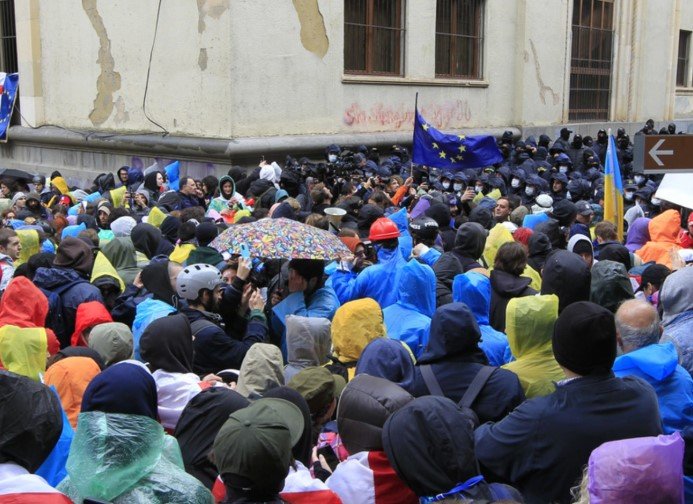Protests in Georgia have intensified as demonstrators gather once more in the capital, Tbilisi, to voice their anger over the government’s decision to delay negotiations on joining the European Union.
For the sixth consecutive night, protesters clashed with riot police near Georgia’s parliament. The police used water cannons and tear gas to disperse the crowds, while demonstrators retaliated by throwing fireworks and erecting barricades on Tbilisi’s central boulevard. As the violence escalates, nearly 300 protesters have been detained, and 26 people, including three police officers, have been hospitalized with injuries.
What’s Behind the Continued Unrest?
At the heart of these ongoing protests is the Georgian government’s decision to suspend EU accession talks until 2028. Prime Minister Irakli Kobakhidze, leader of the ruling Georgian Dream party, made this announcement in the wake of the European Parliament’s rejection of the results of Georgia’s October parliamentary elections. The European Union’s disapproval of the election outcome has sparked a chain of events that has left the country in turmoil.
For many Georgians, the EU represents hope for a future free from Russia’s influence. The decision to delay EU talks is being seen as a major setback in the country’s efforts to integrate with the West. Protesters, particularly those from the opposition Unity National Movement, are demanding new elections and a renewed commitment to EU membership.

The Growing Divide: Protesters vs. the Government
Tamar Kordzaia, a member of the opposition group Unity National Movement, voiced the frustration felt by many protesters. “The more force they use, the angrier people become,” she said, speaking of the heavy-handed tactics employed by police. “Everyone they arrest has relatives, and everyone understands that this is injustice.”
Kordzaia remains confident that the protests will eventually achieve their goals. She emphasized the exhaustion she observed among the police on Monday night, noting that the protesters only need to “withstand a little longer” to force the government’s hand.
Despite the violent clashes, the government appears steadfast. Prime Minister Kobakhidze has repeatedly stated that Georgia will pursue its EU aspirations, but only on terms that are acceptable to the government. This message has not assuaged protesters, many of whom believe that the government is compromising the country’s future in favor of political interests tied to Russia.
A Vote of No Confidence
The October 26 parliamentary election, which returned the ruling Georgian Dream party to power, is at the center of the protests. The opposition and pro-Western President Salome Zourabichvili have accused the government of manipulating the vote, allegedly with assistance from Russia. Both the opposition and many Georgians believe that the elections were not free or fair, sparking claims of foreign interference.
The government’s narrow victory, despite widespread allegations of electoral fraud, has only deepened the sense of mistrust in the ruling party. These accusations of election rigging have left the political environment in Georgia tense, with accusations flying from all sides. The opposition parties, which have boycotted the parliament since the election results, are pushing for new elections to restore credibility to the country’s democratic process.
The International Impact
The ongoing unrest is not just a domestic issue for Georgia; it has wider implications for the country’s relationship with the European Union and Russia. With the EU expressing disappointment over the election results and the government’s decision to delay EU talks, the political and diplomatic fallout is continuing to unfold. The protests have put Georgia at the center of international scrutiny, with Western leaders calling for a peaceful resolution and a return to democratic norms.
At the same time, the growing tensions between the government and protesters are drawing the attention of Moscow. Russia has historically had significant influence over Georgia and has watched the protests with growing concern. The possibility of Georgia’s closer integration with the EU is seen as a threat to Russian influence in the region, which may prompt further pressure on the Georgian government to halt any moves toward the West.
What’s Next for Georgia?
As the protests show no signs of abating, the big question is: what happens next? Will the government concede to calls for new elections, or will the opposition continue to fight for EU membership despite the setbacks?
In the coming days, the situation is likely to escalate further. With thousands still rallying against the government’s decision, the likelihood of more clashes with riot police seems high. However, many protesters believe they can achieve their objectives if they remain united.
The stakes for Georgia’s future have never been higher, with the people of the nation demanding their voices be heard. Whether or not the government listens remains to be seen, but the desire for a stronger European future is evident in the streets of Tbilisi. The outcome of these protests could shape the country’s future direction for years to come.
